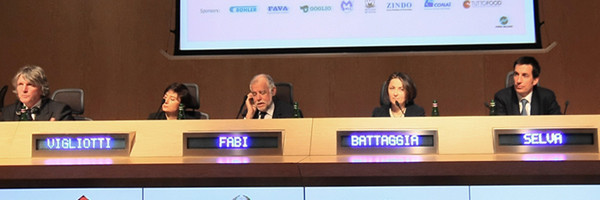More Technology, Safety and Quality – Less Hunger

The United Nations Industrial Development Organization (UNIDO), has vital interest in the fight against world hunger and the reduction of the number of people and families living in poverty. In United Nations terms, this would be translated into the first of the Millennium Development Goals (MDG1) – to halve the proportion of people living on less than $1 a day, which often suffer from hunger and food insecurity. There is concern that, due to the current food crisis with high prices and limited availability, the number of people suffering from hunger will increase instead of decreasing.
The system in which we operate relies on the actions of three specialized agencies in the field: FAO, IFAD, and WFP. These agencies are located at the top of the chain of activities, values, and efforts that lead from land to food and which later, will better describe their own mandates. Our Organization is located on this chain, as it deals with production, conditioning, transportation, storage, preservation, processing, and marketing of agricultural and food products. We are very interested in the equipment used to produce food and industrial crops, and what technology can do to ensure that the agricultural products arrive to the consumer in greater quantities, better quality, timely, and at the lowest price. This approach would result in the minimization of possible losses.
In the words of our Director General, “no agency or institution alone will be able to have a significant impact to reduce the current food crisis. Multi-institutional and concerted efforts are needed. UNIDO is keen to play its part, in collaboration with other key partners, such as FAO, IFAD, African Development Bank, World Bank, WFP, etc.”
The high prices currently experienced on a global scale suggest that it would be necessary to increase the supply of food and other agricultural products. UNIDO aims to improve the availability of products through the enhancement of agro-industry, agro-industrial mechanization efficiency, and the reduction of post-harvest losses.
UNIDO ITPO Italy has been strongly committed to achieve this through its participation in the “International Conference on Sharing Innovative Agribusiness Solutions” held in Cairo at the end of November 2008. Sixteen Italian companies, representing the largest foreign delegation, attended the conference with the support of our staff. An Italian company has been awarded for providing a solution to a cold chain’s problem, proposing the use of passive cooling to reduce post-harvest losses of perishable products.
Our participation in today’s conference is further evidence of UNIDO ITPO Italy’s commitment to achieve the Millennium Development Goals, as far as nutrition and income are concerned. In doing so, we work supporting the initiatives of our Headquarters in Vienna.
The recent high prices for agricultural products are detrimental to food consumers; for example, in recent years, fifty million people were added to those already suffering from hunger. On the other hand, these higher prices act in favor of those who produce food and those who have a surplus to sell, while also stimulating investment and the production of agricultural products.
This is why there is the need to avoid losses and facilitate the processing of primary agricultural products. The recent fall in oil prices should also contribute to the improvement of food supply, given the important role of fuels in the production and processing of agricultural products. Due to this crisis, agriculture and agro-industry are among the most important economic policy issues in many countries.
UNIDO’s actions focus on strengthening production capacities, with an emphasis on the food production chain (production and processing mainly). Beyond its activities, UNIDO participates, along with other UN and Bretton Woods Agencies, in strategic studies and in the definition of economic policies/sectoral guidelines to be proposed to different governments interested in analyzing and implementing them.
I would like to discuss the work done by UNIDO, in collaboration with FAO and IFAD, in the framework of the Global Forum with India (April 2008), where a joint vision on the future of agro-industry was developed with the participation of 500 policy-makers and industry experts. It was also proposed to enhance our collaboration with International Financial Institutions – the only ones able to offer, through co-financing with States and the private sector, the necessary capital for investments in productive infrastructure, productivity, competitiveness enhancements, as well as strengthening the agro-industry.
For the moment, I would like to go back to the Cairo Conference and provide a brief overview of the obtained results, as far as the solutions to improve food and agricultural products supply are concerned.
My colleague, Mr. Karl Schebesta, from UNIDO HQs in Vienna, will illustrate the details of the expansion of agro-industry.

